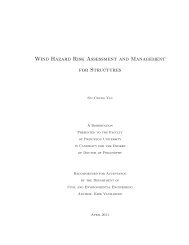Mental Health Nursing
Mental Health Nursing
Mental Health Nursing
You also want an ePaper? Increase the reach of your titles
YUMPU automatically turns print PDFs into web optimized ePapers that Google loves.
‘Can you tell me something about your recent experiences?’ or ‘What was<br />
happening that resulted in your admission to hospital?’<br />
Once broad areas of functioning and experience have been identified,<br />
the assessor then selects those that are relevant to the patient’s present<br />
admission. To facilitate this process it is useful to summarise the information<br />
that has been obtained, highlighting those that need to be explored<br />
in greater detail. This is helped by using the skills of paraphrasing, summarising<br />
and reflection. A typical question might include ‘We’ve now got<br />
a lot of information on what has been happening for you, which is very<br />
helpful. You’ve said that you’ve been experiencing some difficult emotions<br />
lately – can you tell me some more about these?’<br />
As the interview progresses into the selective assessment stage, the<br />
style of questioning changes to more leading questions as these give the<br />
patient an indication of the nature of the information that is needed<br />
(Hawkins, 1986). For example, if open-ended questions result in responses<br />
that are too lengthy or discursive, a question such as ‘You mentioned earlier<br />
that you’ve been feeling under pressure – can you tell me some more<br />
about this?’ may help to focus the response. Note that this question selects<br />
one of the patient’s earlier responses and provides a prompt as to the areas<br />
of their experience about which information is sought. It is at this stage<br />
that more specific nursing models or diagnostic schemes may be utilised<br />
to provide some structure to information gathering, although it is still<br />
important to ensure that all psychological, social and biological areas of<br />
functioning are given consideration. Where indicated, semi-structured<br />
interviews are used to help identify relevant problems. If areas of functioning<br />
that are not directly related to the nurse’s expertise are identified<br />
as warranting further attention, an initial management plan suggesting<br />
referral to other members of the ward team or other agencies should<br />
be developed.<br />
The third stage of the interview process then focuses on the specific<br />
details of the problems identified (Hawkins, 1986). This is characterised<br />
by greater structure and may involve the use of closed questions to refine<br />
the interview process. Barker (1997) developed Kipling’s Six Honest Serving<br />
Men, quoted at the beginning of this chapter, and suggests basing<br />
questions around the words, what, where, when, who, why, how, to obtain<br />
specific information regarding the patient’s problems.<br />
Observation<br />
Observation is defined as<br />
Acute psychiatric in-patient assessment 15<br />
regarding the patient attentively while minimising the extent to which they feel under<br />
surveillance. (SNMAC, 1999: 2)
















